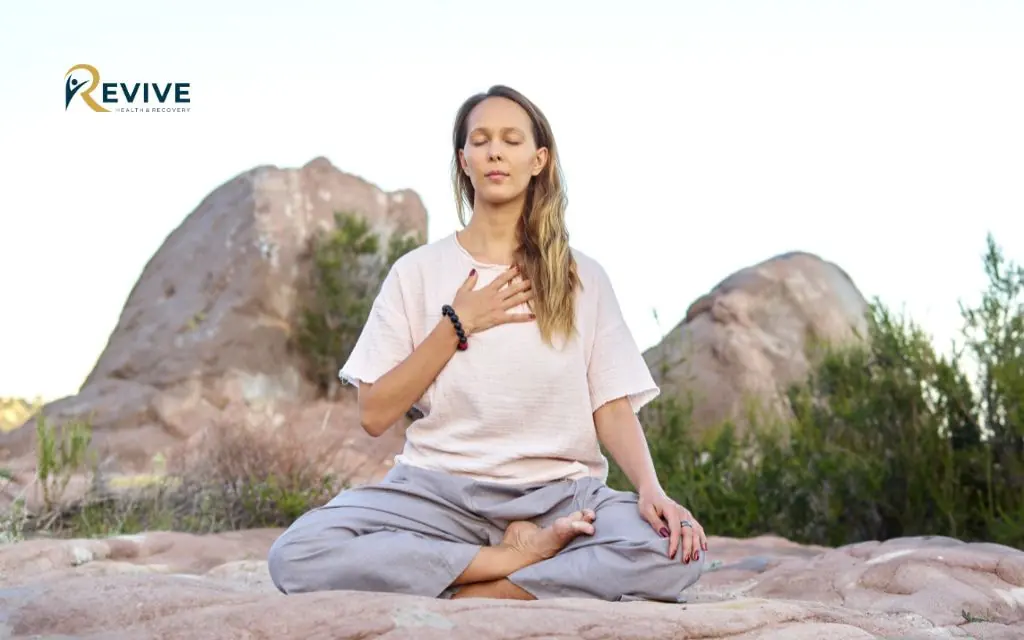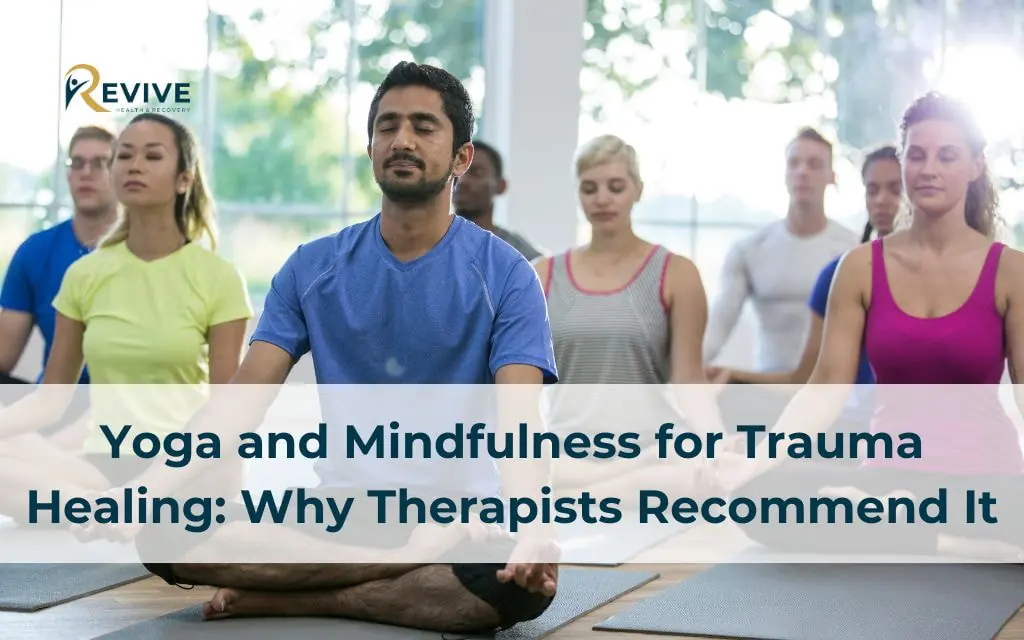Trauma lives in both the mind and body, creating persistent patterns that disrupt daily functioning. The journey of trauma recovery begins with understanding the right solutions for you. Yoga and mindfulness practices offer powerful tools for trauma healing by reconnecting these fragmented aspects of self through intentional movement, breath, and present-moment awareness. Similar to Somatic Experiencing, this evidence-based practice also helps trauma survivors rebuild safety within their bodies and reclaim control over their physiological responses.
At Revive Health Recovery in Denver, we integrate these holistic approaches to trauma healing with traditional therapeutic modalities to create comprehensive trauma healing programs. Our center recognizes that trauma recovery requires addressing both psychological and somatic components to achieve lasting transformation.
Understanding Yoga and Mindfulness for Trauma Healing
What is Trauma-Informed Yoga?
Trauma-informed yoga fundamentally differs from conventional yoga classes by prioritizing psychological safety and internal awareness over physical achievement. This specialized approach incorporates modifications that empower participants to make choices about their practice, avoiding poses that might trigger trauma responses.
Dr. Bessel van der Kolk, a pioneering trauma researcher and author of “The Body Keeps the Score”, has conducted extensive research demonstrating how trauma-informed yoga significantly reduces PTSD symptoms. His studies reveal that yoga practices help trauma survivors reconnect with their bodies in a controlled, gradual manner that builds resilience. For individuals seeking holistic approaches to trauma healing, trauma-informed yoga offers a safe pathway toward recovery.

“The issue for traumatized people is that they don’t own themselves anymore. Any loud sound, anyone insulting them, hurting them, saying bad things, can hijack them away from themselves. And so what we have learned is that what makes you resilient to trauma is to own yourself fully.” – Bessel van der Kolk.
This perspective highlights the importance of a journey of resilience in trauma recovery, empowering survivors to reclaim their sense of self.
Trauma-informed yoga instructors receive specialized training to understand trauma physiology and recognize signs of dysregulation. They create predictable, consistent environments and offer continuous permission for practitioners to adjust or opt out of activities that feel unsafe.
What is Mindfulness-Based Stress Reduction (MBSR)?
Mindfulness-Based Stress Reduction (MBSR) program combines systematic meditation practices with present-moment awareness training to help trauma survivors develop emotional regulation skills. Developed by Jon Kabat-Zinn at the University of Massachusetts Medical Center, this structured 8-week program teaches participants to observe their thoughts and sensations without judgment.
Research published in the Journal of Clinical Psychology demonstrates that MBSR programs significantly reduce hyperarousal and emotional reactivity in trauma survivors. The practice creates a foundation for participants to observe triggering thoughts or sensations without being overwhelmed by them.
The Mindfulness-Based Stress Reduction program includes:
- Body scan meditation
- Seated meditation
- Gentle yoga movements
- Walking meditation
- Daily mindfulness practices
How Yoga & Mindfulness Heal Trauma
Trauma healing through yoga and mindfulness operates through several key mechanisms:
- Breathwork: Conscious breathing practices directly impact the autonomic nervous system, activating the parasympathetic “rest and digest” response that counteracts the hypervigilance common in trauma survivors.
- Movement: Gentle, intentional movement helps release tension stored in the body and creates new neural pathways that override trauma responses.
- Meditation: Regular meditation practice strengthens the prefrontal cortex, enhancing executive function and reducing the amygdala’s hyperreactivity to potential threats.
Neuroscience research from the National Center for PTSD confirms these practices create measurable changes in brain structure and function. MRI studies show increased gray matter density in regions responsible for learning, memory, emotion regulation, and perspective-taking after consistent mindfulness practice. Understanding how yoga and mindfulness help with trauma healing provides a scientific foundation for their inclusion in treatment plans.
Benefits of Yoga and Mindfulness for Trauma Healing
Emotional and Psychological Benefits
Trauma survivors who engage in regular yoga and mindfulness practices report significant improvements in psychological well-being, including:
- Reduced intrusive memories and flashbacks
- Decreased anxiety and hypervigilance
- Improved emotional regulation
- Enhanced self-compassion
- Greater sense of agency and control
- Reduced depression symptoms
Research from the University of Wisconsin documents how these practices help survivors develop a “witnessing consciousness” that allows them to observe their trauma responses without being consumed by them. The benefits of yoga and mindfulness for trauma healing extend beyond symptom reduction to include improved quality of life and renewed sense of possibility. For those struggling with childhood trauma, these practices can offer a transformative path to recovery.

Physical Benefits
The physical benefits of yoga and mindfulness extend beyond typical exercise advantages:
- Improved sleep quality and duration
- Reduced chronic pain associated with trauma
- Normalized heart rate variability
- Decreased stress hormones like cortisol
- Enhanced immune function
- Reduced inflammation markers
These physical improvements reflect the body’s shift from a persistent “fight-or-flight” state to a more balanced autonomic function.
Community and Social Support
Many trauma recovery programs in Denver incorporate group yoga and mindfulness sessions to foster connection and reduce isolation. These community-based healing environments provide:
- Normalized experiences of trauma symptoms
- Reduced shame and stigma
- Opportunities to practice healthy boundaries
- Shared accountability for consistent practice
- Vicarious learning through others’ healing journeys
The collective healing experience creates a powerful framework for recovery that extends beyond individual therapy sessions. Many practitioners registered with Yoga Alliance offer specialized group programs focused on community healing.
How to Get Started with Yoga & Mindfulness for Trauma Healing
Find Yoga and Mindfulness Therapists in Denver
Denver offers numerous qualified practitioners specializing in trauma-informed approaches:
Certified Trauma-Sensitive Yoga Instructors:
- Search the Trauma Center Trauma-Sensitive Yoga (TCTSY) directory for certified instructors
- Review Denver practitioners registered with Yoga Alliance who list trauma specialization
- Contact Revive Health Recovery for our trauma-informed yoga program information and schedule
Mindfulness Practitioners:
- Look for instructors certified in MBSR or Trauma-Sensitive Mindfulness
- Verify credentials and specialized trauma training
- Request a consultation before committing to sessions
When searching for a therapist for yoga and mindfulness for trauma healing in Denver, prioritize practitioners who integrate both clinical trauma knowledge and specialized yoga/mindfulness training.
How to Start Yoga & Mindfulness for Trauma Healing
Beginning a yoga and mindfulness practice for trauma healing requires thoughtful preparation:
For Beginners:
- Start with individual sessions rather than group classes when possible
- Communicate boundaries and needs with your instructor
- Begin with short practices (5-10 minutes) and gradually increase duration
- Focus on restorative and gentle practices rather than vigorous styles
- Incorporate grounding techniques before and after practice
Resources for Trauma Survivors:
- Mobile apps like Insight Timer offer specialized trauma-informed meditations
- Books like “Overcoming Trauma through Yoga” provide home practice guidance
- Online platforms like Yoga for Trauma Healing offer trauma-specific instruction
Mind-body practices for trauma require consistency rather than intensity. Even brief daily practices yield more significant benefits than occasional longer sessions. If you’re wondering how to start yoga and mindfulness for trauma healing, remember that small, consistent steps often lead to the most sustainable progress.
Cost of Yoga and Mindfulness Therapy for Trauma Healing in Denver
The investment in yoga and mindfulness therapy for trauma healing varies based on several factors including session type, provider expertise, and program duration. At Revive Health Recovery, we understand that financial considerations are an important part of your treatment planning process.
We offer various payment options and work with most major insurance providers to make trauma healing accessible to all who need it. Many of our programs provide flexible pricing structures, and we can direct qualified individuals to community resources when appropriate.

For detailed information about our current rates, insurance coverage options, and financial assistance programs, please contact our office directly at (303) 268-4655 or email us at contact@revivehealthrecovery.com for a free consultation. Our staff can provide personalized information based on your specific needs and circumstances.
Frequently Asked Questions (FAQs)
How does yoga help with trauma healing?
Yoga helps trauma healing by addressing both physiological and psychological aspects of trauma. The practice reduces hyperarousal in the autonomic nervous system, releases tension held in the body, improves body awareness, and enhances emotional regulation. Unlike talk therapy alone, yoga provides tools to manage the somatic aspects of trauma that remain stored in the body.
What’s the difference between trauma-informed yoga and regular yoga?
Trauma-informed yoga differs from conventional yoga in several key ways:
– Emphasizes choice and agency throughout the practice
– Avoids physical assists without explicit permission
– Uses invitational language rather than commands
– Limits triggering poses (like deep backbends or inversions)
– Creates predictable, consistent environments
– Minimizes external stimuli (like music or incense)
– Offers modifications and alternatives for all instructions
These adaptations create psychological safety critical for trauma recovery.
Is mindfulness safe for people with severe PTSD?
Mindfulness can be beneficial for severe PTSD when properly modified and introduced gradually. People with severe PTSD should:
– Work with practitioners specifically trained in trauma
– Start with externally-focused mindfulness (awareness of surroundings) before internal focus
– Use grounding techniques alongside meditation
– Practice for short durations with gradual increases
– Include movement components rather than solely seated meditation
– Certain PTSD symptoms may temporarily intensify when beginning mindfulness practice, making professional guidance essential. Reviews of yoga and mindfulness therapy for trauma healing indicate that proper trauma-informed modifications are critical for safety and effectiveness.
Are there free yoga and mindfulness programs for trauma survivors in Denver?
Denver offers several free or low-cost options for trauma survivors:
The Phoenix Non-Profit provides free trauma-informed yoga classes
Denver Public Library hosts free mindfulness sessions
Veterans can access free programs through the VA Eastern Colorado Health Care System
The Trauma Healing Foundation offers scholarship-based programs
Community mental health centers provide group programs on sliding scales
Yoga and mindfulness for trauma healing in Denver includes many accessible options for those with financial constraints.
What are the best online mindfulness courses for trauma healing?
Reputable online trauma-informed mindfulness courses include:
– Trauma-Sensitive Mindfulness with David Treleaven
– Mindfulness-Based Cognitive Therapy for Trauma
– The Mindful Path Through Trauma Recovery
– iRest Yoga Nidra for Trauma
– MBSR Online with qualified trauma-informed teachers
Conclusion
Yoga, mindfulness, and other spiritual practices offer profound pathways to healing for trauma survivors by addressing the mind-body connection often overlooked in traditional therapeutic approaches. These practices provide concrete tools for regulating the nervous system, processing traumatic memories safely, and rebuilding a sense of agency and wholeness.
In Denver, Revive Health Recovery stands as a leader in integrating these evidence-based mind-body practices with comprehensive trauma treatment. Our trauma-informed practitioners combine clinical expertise with specialized yoga and mindfulness training to create individualized healing programs that address each person’s unique trauma experiences.
The journey of trauma healing requires both courage and support. Whether you’re beginning to explore these approaches or seeking to deepen your existing practice, reaching out for professional guidance represents a powerful step toward recovery. Find yoga and mindfulness therapists for trauma healing in Denver who understand your specific needs and can guide you through this transformative process.
Contact Revive Health Recovery today at (303) 268-4655 to schedule a consultation and learn how our yoga and mindfulness programs can support your trauma healing journey.



